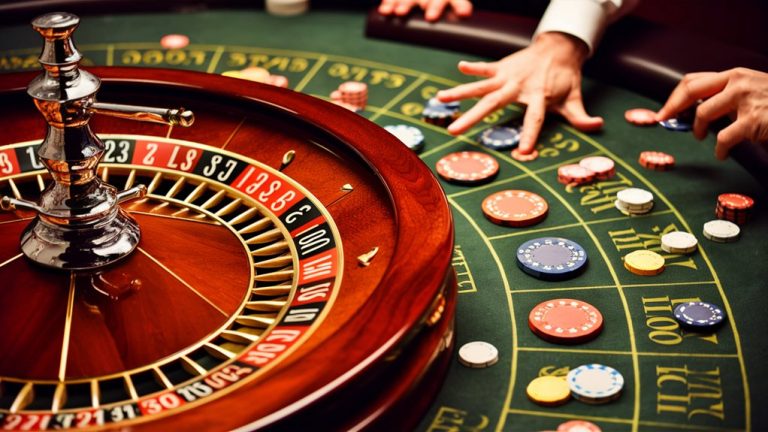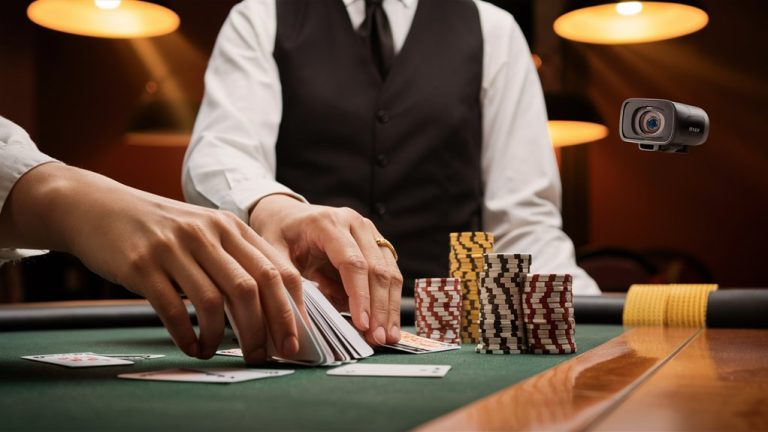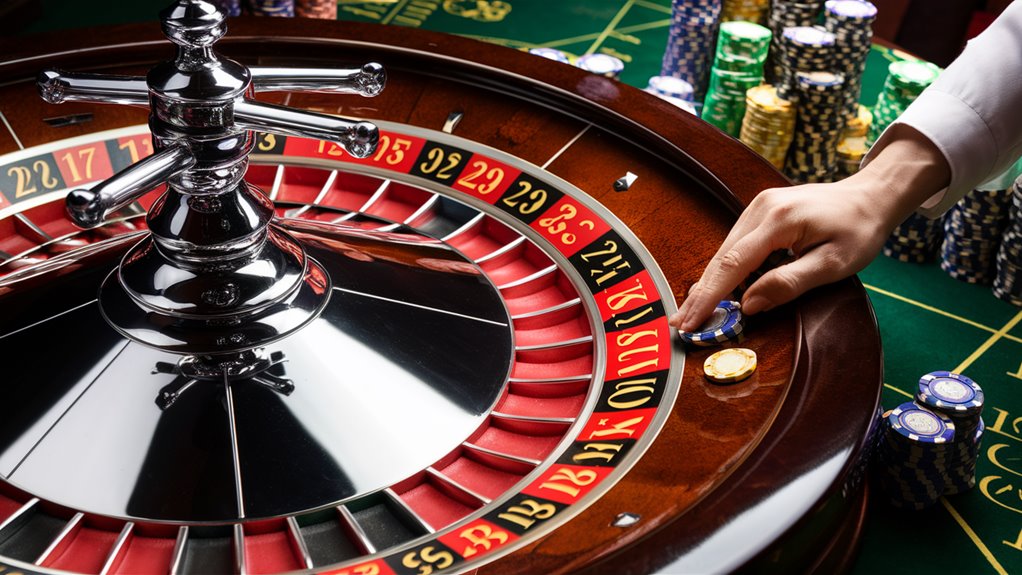
Winning at Roulette: Basic Stats and Plans
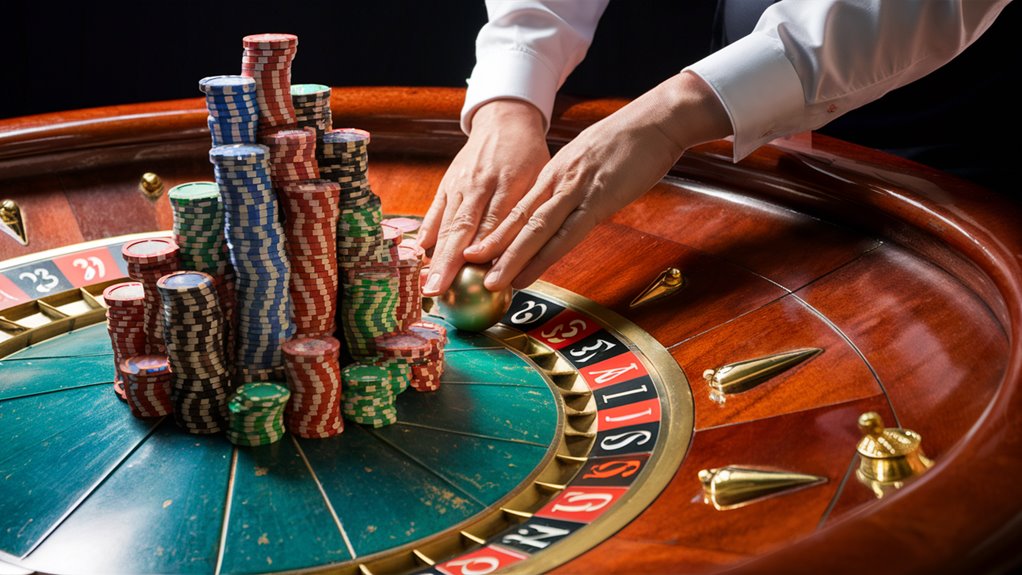
What Roulette Chances Mean
The math of roulette shows key info on win chances and number odds. European roulette has a 2.7% edge for the house, while American roulette has a 5.26% house edge. Picking the right wheel matters for good play.
Old Win Tales and Number Checks
Joseph Jagger’s big win in 1873 at Monte Carlo Casino shows how math helped in roulette. He used number tracking to win $325,000 (now $7 million) through smart bets.
Top Bet Plans and Money Rules
Best Bet Ways
- Use the European wheel for a smaller house cut
- Cover 1/3 of the table, losing about 1.75% on bets
- Only bet 2% of your money each time
Rules to Cut Risks
- Write down all results and check them
- Set strict loss limits
- Avoid bets that grow after you lose
Number Odds in Today’s Roulette
Doing well at roulette means knowing odds math and using tested bet methods. Lasting profit is hard due to casino odds, but short wins can happen with strong plans and tight control of your bets.
Make the Most of Stats to Win
To master roulette, mix old win ways with new number checks. Rely on solid math plans not growing bets.
Famous Roulette Wins
The Monte Carlo Champ: Joseph Jagger’s Number Win
Joseph Jagger changed roulette play in 1873 at Monte Carlo Beaux-Arts Casino. He watched many spins and found wheel issues that helped him choose winning numbers.
His smart way, focused on biased numbers, won him $325,000 (now $7 million). His method made him a key figure in using math for bets.
Charles Wells: The Bank Breaker
In 1891, Charles Wells became famous with a huge win at Monte Carlo. He turned a small amount into one million francs using a deep bet plan over 12 hours.
His success of “breaking the bank” multiple times is well-known in casino history, showing good bet strategies can work.
The Eudaemons: Betting Tech Pioneers
The Eudaemons group made waves in 1978 by using physics and tech for roulette. Their hidden computers watched ball moves and wheel turns, giving them a big 44% edge.
This tech move in watching and guessing stop spots is a top point in roulette plan history, changing how people think of casino game odds.
Win Keys
- Number Studies: Keep track of wheel acts
- Tool Tips: Spot wheel flaws
- New Tech: Use computers in bets
- Timed Bets: Watch balls and wheels well
House Edge Math Bits
House Edge Numbers in Casinos
Truth in Roulette Math
Casino math tells the truth about roulette’s house edge.
European roulette has a 2.7% house edge, which means a likely $2.70 loss for every $100 bet.
American roulette has a tougher 5.26% house edge because of an extra zero.
Odds and Payout Checks
The math behind roulette odds shows why the house stays ahead.
European roulette gives a 35:1 payout for single number bets, while real odds are 36:1. This small gap gives the casino its edge.
With 37 possible outcomes, single number bets have a 2.7% win chance (1/37), but payouts act as if the chance were 1/36.
Expecting to Lose Over Time
Continuous math shows what happens with lots of play.
Betting $10 per spin, 100 times an hour, means $1,000 in play. The 2.7% house edge in European roulette leads to a likely $27 lost each hour.
The higher American roulette edge means losing about $52.60 per hour. These are fixed, no matter the bets or plans used.
Bet Plans That Work
Best Bet Plans: Number Based
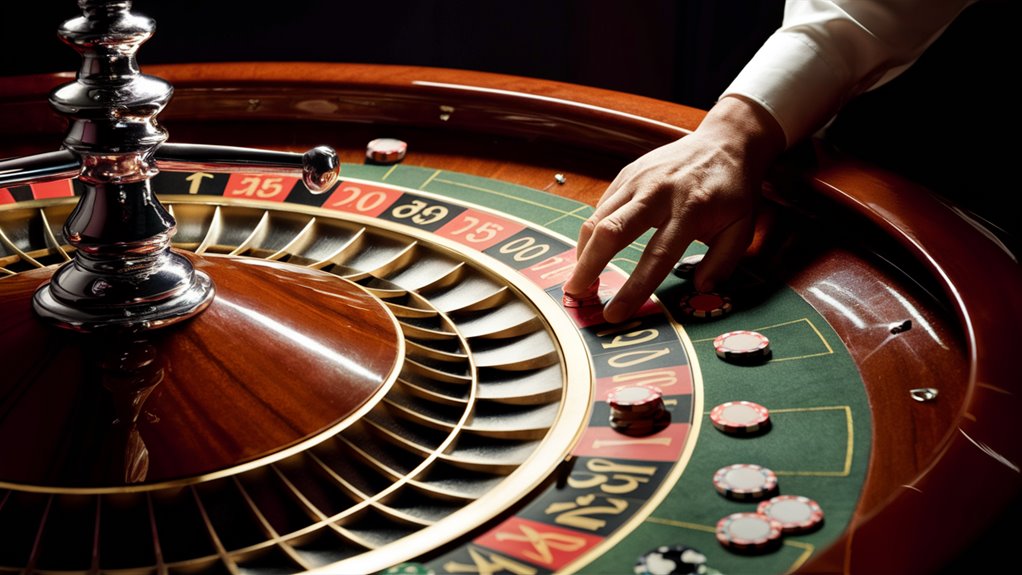
Knowing House Edges in Casinos
Exact number odds show that no plan can beat the built-in house edge in casino games.
Years of games show why common bet plans don’t work.
Well-Known Bet Systems Checked
The Martingale Plan
The Martingale bet strategy asks you to double bets after each loss.
Starting with a $5 bet, eight straight losses (0.61% chance) mean a $1,280 bet to get back lost money. Casino bet caps and limited money make this plan hard to keep up.
The D’Alembert Bet Way
The D’Alembert method slowly changes bets, adding one after losses and dropping one after wins.
Checking 1,000 spins shows it ends up just like flat bets.
Fibonacci Number Plan
Using the famous number row, the Fibonacci betting plan seems like it helps you get back lost money.
But deep number work shows it also leads to losses, thanks to the casino edge.
Math Proof Against Bet Plans
All bet systems, even old or complex ones, face set number odds.
The house edge makes sure that growing bet plans can’t give good results over many games.
Bet Caps and Money Rules
Casino bet caps stop big bet plans. These limits, plus the money you can bet, block the endless growth needed to come back after big losses.
Smart Money Rules for Roulette
Smart Money Tips for Roulette
How to Split Your Gambling Money
Good money rules are key to good roulette play.
Split your total bet money into parts, using 20% per game time. This way, you protect your cash during bad play times and keep good bet discipline.
Right Bet Sizes
Small bets let you play longer and more safely.
Keep bets to 2-3% of your money for the game. With $500 ready to go, keep bets between $10-15, giving you 33-50 tries even if you lose a lot at once.
When to Stop
Set clear money goals like this:
- Stop at 50% more than you started with
- Stop losing after dropping 50% of what you started with
- Example: $500 to start means stop at $750 high or $250 low
- Stats show 37% chance of hitting your high goal each time
Track How You Do
Write down each bet to check your plan:
- Keep detailed logs of games
- Look at bet patterns
- Change plans based on what happens
- Watch wins and losses over many games
This careful way boosts long play through smart changes and choices.
Ways to Cut Risks
Cutting Risks in Casino Games
Smart Money Rules
Smart risk cutting starts with top-notch money rules that limit risk while letting you play a lot.
With a house edge of 5.26%, you need smart plans to keep your cash and play longer.
Good Ways to Cover Bets
The 1/3 table bet plan balances risks and wins by placing bets on twelve numbers at once.
This math move cuts possible losses to 1.75% each game while keeping win chances good.
Setting strict bet caps at 2% stops big money blows.
Low-Risk Plans and Not Losing More
Slow bet growth is a key safe plan, dropping bet size after wins.
This approach locks in cash while keeping risks low during ups and downs.
The D’Alembert plan also cuts risks by changing bet sizes careful during wild game times.
Set Hard Stops
Having firm stop-loss points at 20% of your money makes strong safety lines.
These set stop points stop bad calls and protect your cash when luck is not on your side.
Using many safe bet ways sets up a full safety net needed for long play.
Key Safety Pieces
- Bet size caps
- Slow bet growth ways
- Stop-loss rules
- Cover lots of numbers
- Change bets as needed
Mistakes Players Make
Mistakes Roulette Players Often Make
Bad Bet Plans
Martingale plans and other bet growth ways are big traps for roulette players. Growing bets after loses burns through cash fast and can go past table limits.
Players often trust in “hot numbers,” missing that each spin starts fresh.
Money Rule Mistakes
Poor money rules really hurt how long you can play. Big errors are:
- Not setting firm loss stops
- Not having clear win goals
- Playing on after hitting profit goals
- Chasing losses more than set stop points tell
- 먹튀검증 공식 추천 확인하기
Thinking Math is Wrong
The big mistake is thinking bet systems can beat the casino’s math lead. The house edge stays the same:
- European Roulette: 2.7%
- American Roulette: 5.26%
No mix of bets or timing changes these fixed chances. Each spin is its own, making systems based on patterns wrong in math Stock Trading and Gambling
More Risks Than You Think
Many bets at once feel safe but actually raise your risk. This big error boosts how much the house edge costs you, speeding up loses over getting more wins.
Staying True to Your Plans
Good roulette play needs you to stick to set bet limits and know the game’s randomness. Players must not change their bet plans based on how they feel or what they think they see.
